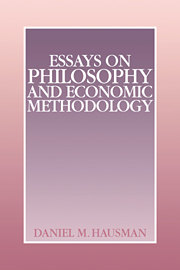Book contents
- Frontmatter
- Contents
- Introduction: What is philosophy of economics?
- PART I METHODOLOGY AND THEORY APPRAISAL
- 1 Economic methodology in a nutshell
- 2 On the conceptual structure of neoclassical economics – a philosopher's view
- 3 John Stuart Mill's philosophy of economics
- 4 The deductive method
- 5 Why look under the hood?
- 6 An appraisal of Popperian methodology
- 7 Is falsificationism unpractised or unpractisable?
- 8 The limits of economic science
- PART II CAUSALITY IN ECONOMICS
- PART III CASES AND PUZZLES
- PART IV POSTSCRIPTS
- Bibliography of relevant writings by Daniel M. Hausman
- Bibliography of works by other authors
- Index
6 - An appraisal of Popperian methodology
Published online by Cambridge University Press: 05 June 2012
- Frontmatter
- Contents
- Introduction: What is philosophy of economics?
- PART I METHODOLOGY AND THEORY APPRAISAL
- 1 Economic methodology in a nutshell
- 2 On the conceptual structure of neoclassical economics – a philosopher's view
- 3 John Stuart Mill's philosophy of economics
- 4 The deductive method
- 5 Why look under the hood?
- 6 An appraisal of Popperian methodology
- 7 Is falsificationism unpractised or unpractisable?
- 8 The limits of economic science
- PART II CAUSALITY IN ECONOMICS
- PART III CASES AND PUZZLES
- PART IV POSTSCRIPTS
- Bibliography of relevant writings by Daniel M. Hausman
- Bibliography of works by other authors
- Index
Summary
Professor Klant, in his masterful overview of economic methodology, The Rules of the Game, relies heavily on Karl Popper's writings on the philosophy of science. For, like Popper, Professor Klant is concerned about whether theories are genuinely testable and whether they are truly supported by empirical evidence. I respect these concerns and share them, yet I have serious objections to Popper's philosophy of science. Indeed, I shall argue in this chapter that nontrivial questions about the testability of economics cannot be asked within the confines of Popper's falsificationism. A reasoned concern with falsifiability demands the repudiation of Popper's philosophy of science. Moreover, there is no way to amend his views without eviscerating them and making Popper's central theses little more than truisms accepted no less by anti-Popperians than by Popperians.
Much of the appeal of Popper's philosophy of science depends upon ambiguities and equivocations concerning the notion of falsifiability. I shall argue that the notion of falsification as a purely logical relation between theories and basic statements or observation reports, which Popper has stressed again and again throughout his long career, is irrelevant to any important questions concerning science. On the other hand, Popper's relevant views concerning falsificationism as a methodology or a policy are unfounded and unacceptable.
LOGICAL FALSIFIABILITY
Popper argues that what distinguishes scientific theories, such as Newton's or Einstein's, from unscientific theories, such as Freud's or those endorsed by astrologers, is that scientific theories are falsifiable.
- Type
- Chapter
- Information
- Essays on Philosophy and Economic Methodology , pp. 74 - 91Publisher: Cambridge University PressPrint publication year: 1992



